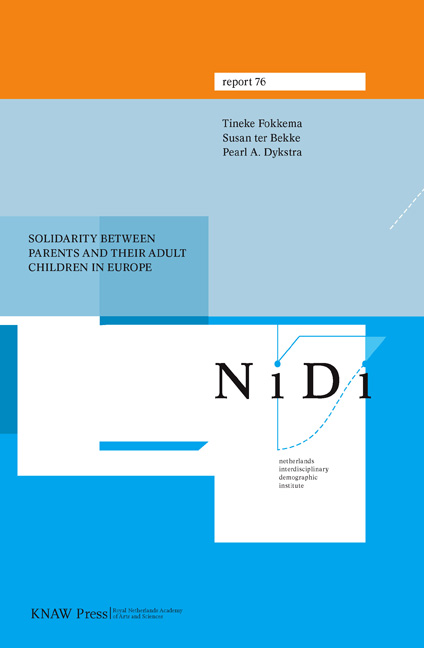Book contents
- Frontmatter
- Contents
- List of Figures
- List of Tables
- Executive Summary
- Acknowledgement
- 1 Introduction
- 2 Geographical Proximity
- 3 Contacts
- 4 Family Care Obligations
- 5 Support Exchange
- 6 Typology of Late-Life Families
- 7 Conclusion and Discussion
- References
- Appendix Measurement of the Independent Variables
- List of NIDI Reports
4 - Family Care Obligations
Published online by Cambridge University Press: 20 January 2021
- Frontmatter
- Contents
- List of Figures
- List of Tables
- Executive Summary
- Acknowledgement
- 1 Introduction
- 2 Geographical Proximity
- 3 Contacts
- 4 Family Care Obligations
- 5 Support Exchange
- 6 Typology of Late-Life Families
- 7 Conclusion and Discussion
- References
- Appendix Measurement of the Independent Variables
- List of NIDI Reports
Summary
Introduction
This chapter focuses on care obligations towards family members. The relevance of examining this normative aspect of solidarity is the interdependence between feelings of obligation and actual support exchange. Earlier research has shown that a sense of duty towards one's family can have a predictive value for the informal care actually exchanged. Elderly American parents, for example, who felt strongly that family should help one another, gave their children more practical and financial help than parents who felt less strongly about this (Lee et al., 1994). Other studies have shown that the more strongly elderly parents and/or their adult children subscribed to the view that children and parents should support one another, the more practical support they received (Broese van Groenou, 2005; Klein Ikkink et al., 1999; Stein et al., 1998). Conversely, actual support exchange has also been found to influence feelings of obligation. According to Festinger's (1957) cognitive dissonance theory, situations in which behaviour conflicts with personal values (cognitive dissonance) are considered undesirable. In order to reduce dissonance, giving or receiving support is retrospectively attributed to a strong sense of duty, and the absence of support exchange could lead to the adjustment of personal values.
In the self-completion questionnaire used in SHARE, a number of items on two types of care obligations were posed: an obligation to care for the elderly and an obligation to care for children and grandchildren. With regard to the first type of obligation, respondents were asked who should bear the responsibility for three aspects of care for the elderly: (1) help with household chores for older persons who are in need such as help with cleaning and washing; (2) personal care for older persons who are in need such as nursing or help with bathing or dressing; and (3) financial support for older persons who are in need. Respondents could choose any of the following answer categories: totally the government, mainly the government, totally the family, mainly the family, both equally.
- Type
- Chapter
- Information
- Publisher: Amsterdam University PressPrint publication year: 2008

